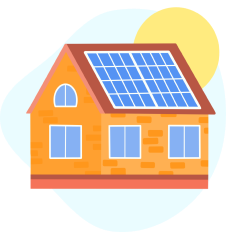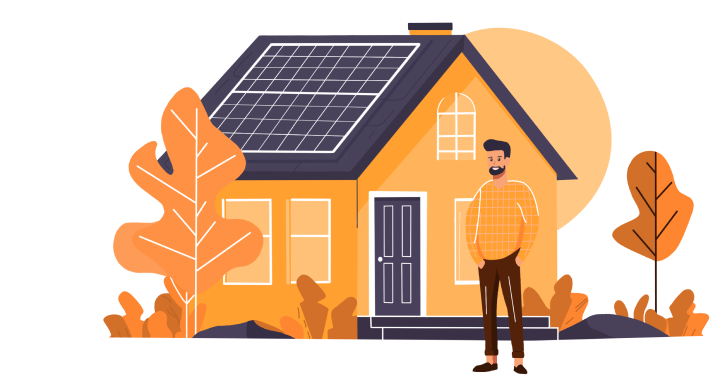Switching to the solar energy world is a big deal for your wallet and the environment. Choosing from top rated solar installers ensures that your transition to solar is not only efficient but also tailored to meet your unique energy needs.
With Solar Energy Host, stepping into a solar future is simple. We connect you with trusted professionals who make installing solar panels straightforward, giving you peace of mind and maximizing your investment. Embrace the opportunity to reduce your energy bills and increase your home's value with the guidance of experts in the field.
Step #1: Determine your solar energy needs.
Start by analyzing your past electricity bills to understand your average consumption. Key points to consider include the seasonal variations in your energy usage and any upcoming changes in your household that might affect this, like a home expansion or purchasing an electric vehicle.
Once you have a clear picture of your energy consumption, project the potential financial and environmental benefits of solar panels. How much could you save monthly or annually on utility bills? Additionally, evaluate the reduction in carbon emissions to gauge the environmental impact.
Using the data from your current and projected energy needs will help top rated solar installers in estimating the size of the solar system needed, from the number of panels needed to the physical space required.
Step #2: Connect with top rated solar installers.
Enter your basic information here at Solar Energy Host, including location, average energy consumption and any specific requirements you have for solar panel installation services. This data will help us get a clear picture of what you're looking for.
Once you've shared your details, our system gets to work. We sift through the best rated solar companies in your region, ensuring that the matches we make align with your specifications and energy goals.
After your information is processed, you will receive competitive quotes from the top rated solar installers in your area. These quotes are tailored to your needs and preferences, offering you a variety of options to compare and choose from.
Step #3: Consider financial options and incentives.
There are different financing options and government subsidies available for solar energy installations. These can significantly bring your initial costs down and make solar more accessible.
Solar loans allow for ownership of the system with the flexibility of payment over time, which can be particularly advantageous due to tax credits and rebates. Alternatively, leases and power purchase agreements (PPAs) offer a way to benefit from solar energy without the responsibilities of ownership, as the system remains owned by the provider.
Be sure to take advantage of any available federal, state, and local incentives, such as tax credits, rebates and grants, which are designed to encourage solar adoption by making it more affordable.
Finally, assess the potential long-term savings and return on investment (ROI) from your solar panels. Consider how the reduction in monthly electricity bills and the potential increase in property value can benefit you in the long term.
Step #4: Check the suitability of installation.
Assess your roof's condition, orientation and shading to ensure it can effectively support solar panels for home use.
In case your roof is not ideal for solar panels due to structural concerns or obstructions that can't be removed, there are alternative options.
Ground mount systems can be set up in open areas where solar panel efficiency is maximized. Another option is solar carports, which utilize the space over driveways or parking areas to install solar panels, providing the dual benefits of generating energy and covering vehicles.
Once you've determined where they can go, discuss how to install solar panels with your chosen provider among the top rated solar installers. This conversation should cover everything from the timeline and steps involved to how they handle unexpected issues like bad weather or the discovery of needed roof repairs.
Frequently Asked Questions (FAQ)
What types of solar panels do installers use?
Top rated solar installers typically offer a variety of panel types tailored to meet different energy needs and budgets.
Monocrystalline panels are favored for their high efficiency and sleek appearance, making them an attractive option for residential installations. Polycrystalline panels, while slightly less efficient, provide a more cost-effective solution for those with ample installation space. Additionally, some providers might offer thin-film solar panels, which are optimal for conditions with lower light levels.
How long do solar installations usually last?
The durability of solar installations is one of their most compelling attributes. Most solar panels from top rated solar installers are backed by warranties spanning ten years or longer, yet their lifespan can extend well beyond this term, continuing to generate power efficiently for up to 30 years.
The longevity of a solar installation is largely dependent on the quality of both the panels and the installation process.
What are solar power incentives and rebates?
To foster the adoption of solar energy, various financial incentives and rebates are available from government entities, utility companies and other organizations. These incentives are designed to lower the initial investment costs and accelerate the return on investment for solar panel installations.
Key incentives include federal tax credits, which provide significant tax reductions based on solar panel prices and state-specific rebates, which vary by location and can further reduce upfront costs.
Save more with the sun's power
At Solar Energy Host, we simplify the process of switching to solar power. By entering basic information, you can connect with top local providers and receive competitive quotes directly to your inbox. Our secure platform ensures a hassle-free experience, offering you the best deals near you.
We're trusted by homeowners nationwide to deliver significant savings and help make informed decisions about their solar installers. Start saving today and see how solar panels can reduce your electricity bills!




















